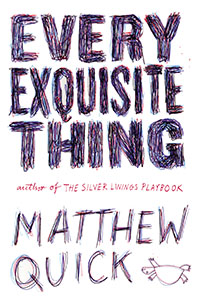Nanette O’Hare isn’t trying to change her life—she’s just trying to survive what looks like an ideal existence: an intact family in a comfortable suburb with the same friends she’s had her whole life. And though she’s only a high-school junior, Nanette—the protagonist in Matthew Quick’s new YA novel, Every Exquisite Thing—is a soccer star destined for a full ride at the college of her choice. Nanette has played on the same team with her friend Shannon since childhood, but she doesn’t have much in common with boy-crazy, heavy-drinking Shannon anymore. And with her parents’ relationship becoming ever more strained, it’s dawning on Nanette that her life might be falling apart.
 Nannette’s first act of rebellion begins before the action of the novel opens—back in middle school, when she doesn’t join her teammates in what eventually is referred to as “the middle school sex scandal.” In an act of reprisal, her teammates tell others that Nanette is a lesbian, though she’s actually straight. After Shannon’s mother comes out when the girls reach high school, Shannon finally stands up for Nanette and stops the rumors, but Nanette never recovers her former popularity. Seeking solace from the brutal high-school lunch room, she hides in the classroom of her English teacher, Mr. Graves, who is himself seeking solace from the negativity of the teacher’s lounge. His concern for Nanette is entirely appropriate—he checks in on her and gives her a copy of his favorite cult classic, The Bubblegum Reaper—but their friendship comes to an abrupt end when Nanette’s swirling emotions cause her to do something she regrets.
Nannette’s first act of rebellion begins before the action of the novel opens—back in middle school, when she doesn’t join her teammates in what eventually is referred to as “the middle school sex scandal.” In an act of reprisal, her teammates tell others that Nanette is a lesbian, though she’s actually straight. After Shannon’s mother comes out when the girls reach high school, Shannon finally stands up for Nanette and stops the rumors, but Nanette never recovers her former popularity. Seeking solace from the brutal high-school lunch room, she hides in the classroom of her English teacher, Mr. Graves, who is himself seeking solace from the negativity of the teacher’s lounge. His concern for Nanette is entirely appropriate—he checks in on her and gives her a copy of his favorite cult classic, The Bubblegum Reaper—but their friendship comes to an abrupt end when Nanette’s swirling emotions cause her to do something she regrets.
After Mr. Graves ceases to be her mentor, Nanette befriends Booker, the disgruntled beatnik who wrote The Bubblegum Reaper. Booker introduces her to the work of nonconformist literary giants such as Charles Bukowski, whom he calls “The Buk,” and to a young poet named Alex who refers to himself “Little Lex.” The teenagers instantly become close, bonding over their devotion to the same book (a book which Booker himself refuses to discuss). Alex listens as Nannette explores her changing feelings about her own life. She realizes she has hated soccer for years and promptly quits, sending her team, family, and personal life into chaos. About this time Alex makes a decision which lands him in jail, putting their growing relationship to the test.
 Every Exquisite Thing is a typical bildungsroman that echoes some classic tales of the genre. The main character is a wealthy, literature-obsessed outsider who seeks to find her way in society. Sound familiar (cough, cough—Holden Caulfield)? And here are two main characters with a complicated, competitive relationship which inspires events that catapult them from childhood to adulthood—ever read A Separate Peace? What separates this novel from others of its genre is its self-aware narrative voice. “I kept getting mad at myself because I realized that there were many kids my age around the world who didn’t have enough food to eat or access to clean drinking water,” Nanette thinks, “and here I was, feeling imprisoned in a fifty-thousand-dollar luxury car en route to top universities that wanted to educate me for free.” This is not the ironic voice of Holden Caulfield, whose self-inflating observations support his own adolescent narcissism. This is a new voice—a singular, modern voice for today’s self-aware adolescent reader.
Every Exquisite Thing is a typical bildungsroman that echoes some classic tales of the genre. The main character is a wealthy, literature-obsessed outsider who seeks to find her way in society. Sound familiar (cough, cough—Holden Caulfield)? And here are two main characters with a complicated, competitive relationship which inspires events that catapult them from childhood to adulthood—ever read A Separate Peace? What separates this novel from others of its genre is its self-aware narrative voice. “I kept getting mad at myself because I realized that there were many kids my age around the world who didn’t have enough food to eat or access to clean drinking water,” Nanette thinks, “and here I was, feeling imprisoned in a fifty-thousand-dollar luxury car en route to top universities that wanted to educate me for free.” This is not the ironic voice of Holden Caulfield, whose self-inflating observations support his own adolescent narcissism. This is a new voice—a singular, modern voice for today’s self-aware adolescent reader.
Just like The Bubble Gum Reaper, the fictional cult classic at the heart of this novel, Every Exquisite Thing is full of the delicious things that turn YA books into real classics: quotable quotes, inside jokes, memorable characters, a community of outsiders—they’re all there. Quick’s first novel, The Silver Linings Playbook, made the successful jump to the silver screen, winning critical acclaim in both formats. Every Exquisite Thing has a similar cinematic feel and is currently being adapted for film, though no release date has been announced.
This novel has the indie appeal of The Perks of Being a Wallflower, the dark humor of Heathers, the literary dimension of Dead Poets Society, and the fraught emotion of Looking for Alaska—and its own voice to boot. The strength of coming-of-age novels is that people never stop coming-of-age—they just turn a year older and learn how to cope with life from a new place. Every Exquisite Thing will appeal to both teen and adult readers because no matter how old you are, you still want to believe what Nanette tries to prove: “Love wins.”

Sarah Carter is a high-school English teacher living and working in Lebanon, Tennessee. She is currently an M.F.A. candidate at the Sewanee School of Letters.
Tagged: Children & YA





